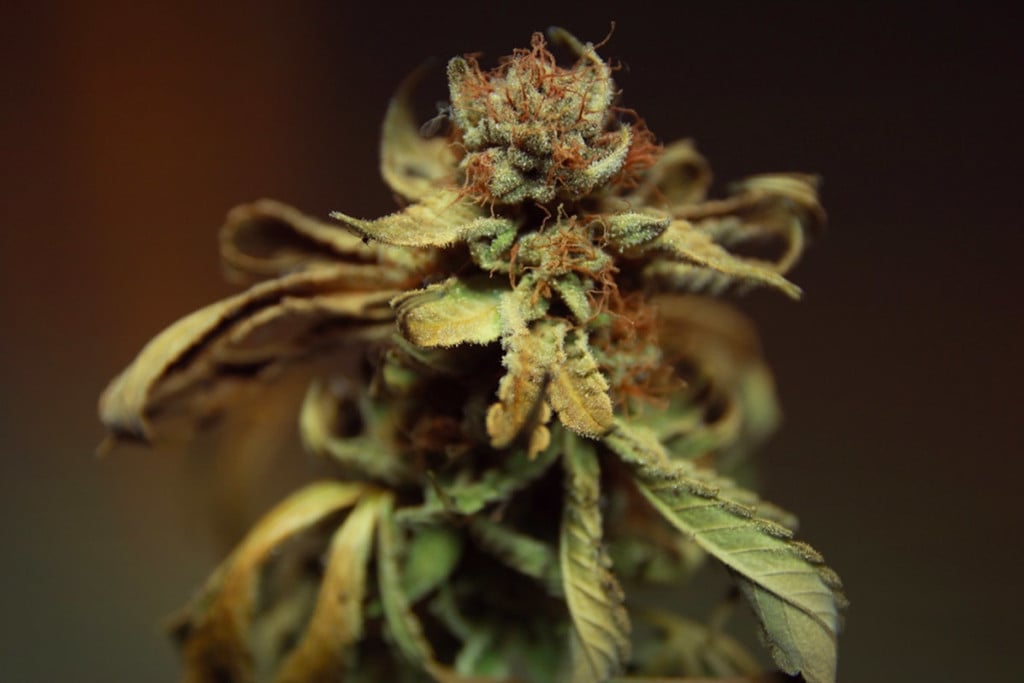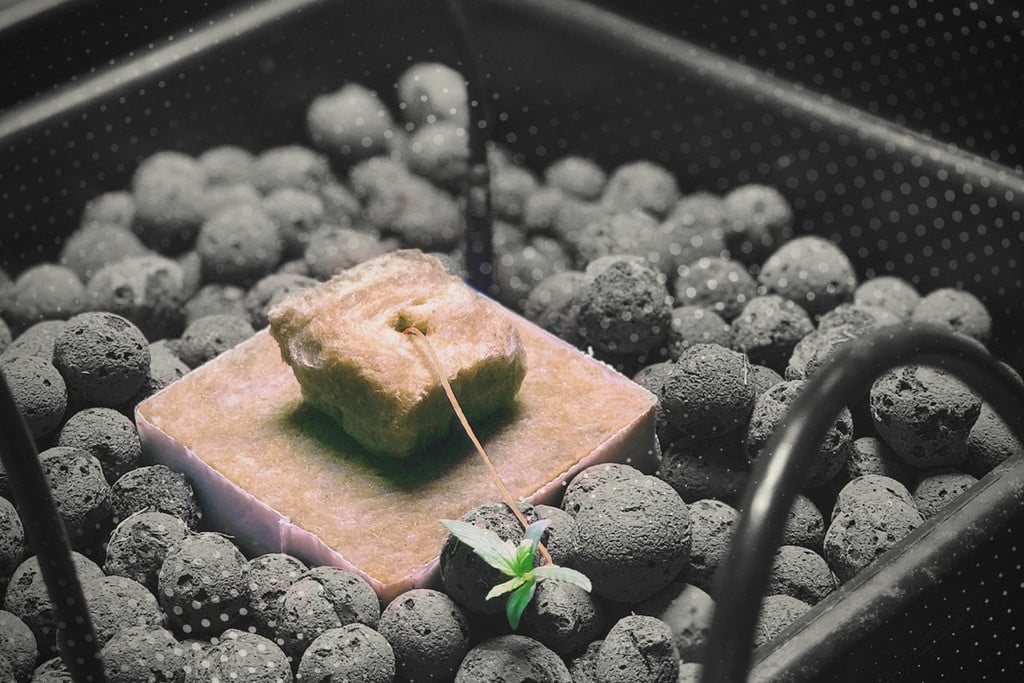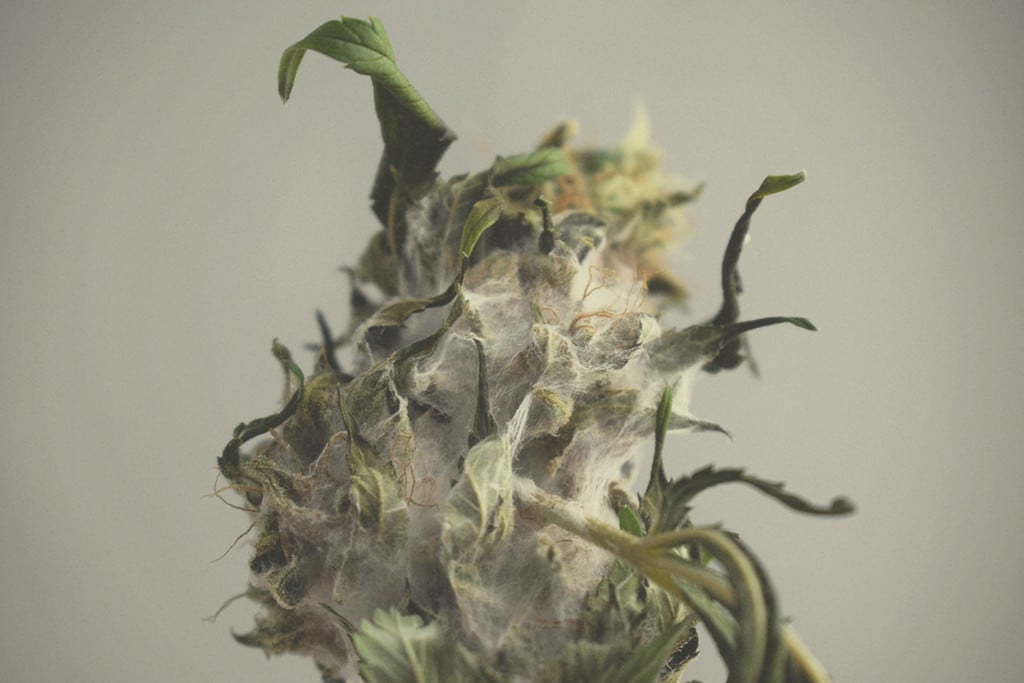.
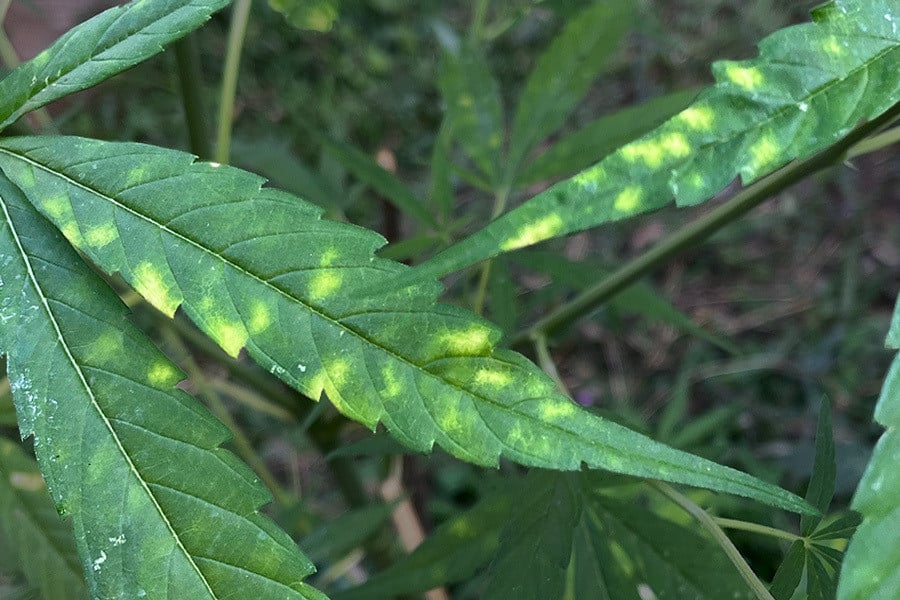
Leaf Septoria and Cannabis: Prevention & Treatment
Cannabis leaf septoria is easy to identify, and not a nightmare to treat. Still, it's better to prevent it in the first place. In this article, we show you how to do just that.
Leaf septoria is a harsh plant disease[4] that regularly affects the foliage of a variety of plants, including cannabis.
If not handled properly, leaf septoria can be devastating to plants, destroying foliage, stunting growth, and ultimately affecting the size and quality of their yields.
In this article, we take a close look at cannabis leaf septoria, and how to treat and prevent this disease from affecting your cannabis crops.
Contents:
What Is Septoria Leaf Spot?
Leaf septoria is a generic name given to a range of fungal infections that cause brown spots to appear on plant foliage[5], damaging overall growth. Different septoria species are more likely to affect different species of plants, but the one we’re interested in (as cannabis growers) is called Septoria lycopersici.
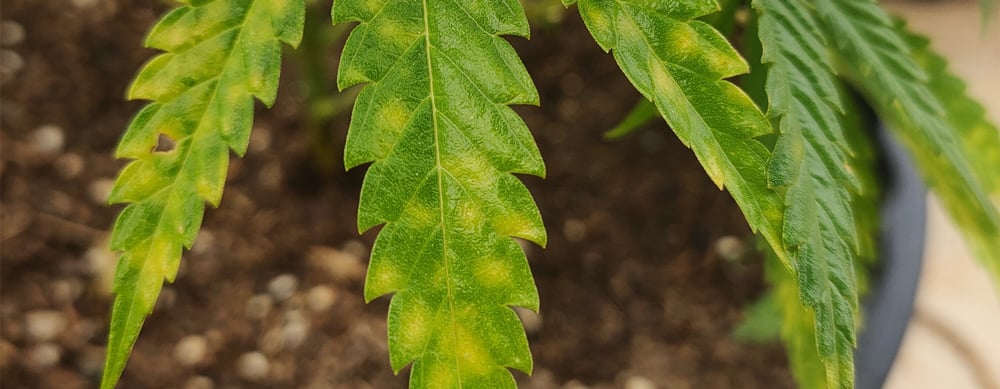
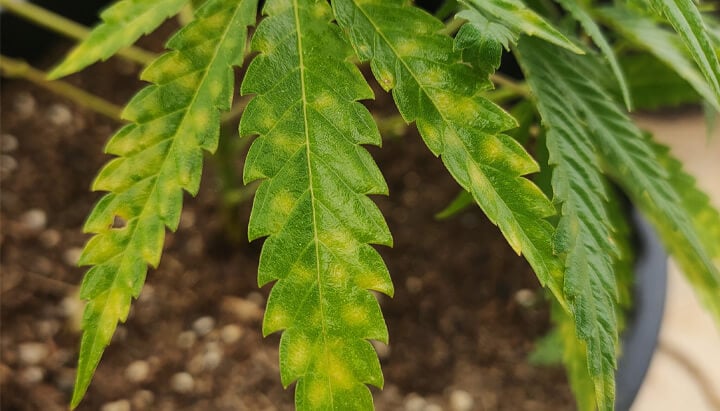
Septoria can affect tomatoes[6], wheat, and parsley, to name but a few other plants. These fungi tend to develop on fallen, decaying foliage, from which spores make their way to living foliage, where they will grow. Depending on the plant affected, septoria can damage the harvest, or totally destroy it.
In cannabis cultivation, it shouldn’t totally ruin a harvest, but it is likely to stunt growth and reduce the final harvest if left untreated. Therefore, knowing a little about it is important, especially if you’re growing cannabis outdoors.
The Disease Cycle of Weed Leaf Septoria
Knowing about the life cycle of cannabis leaf septoria will help you to understand how it works, and therefore how to prevent it.
These fungi overwinter[7] on infected foliage from the year before, usually on fallen leaves. And these needn’t be cannabis leaves—so it might be present in any fallen leaves. In particular, it thrives in cool, wet environments. As spring appears and new foliage grows, septoria spores can spread and make their way to new growth. On cannabis, the infection only becomes apparent once the plant enters the flowering stage, appearing on the lowest growth first.
The Symptoms of Yellow Leaf Spot
You won’t know that septoria is present until it visibly appears on your plant(s). Here’s what to look out for.
- Irregular spots: Septoria causes[8] irregularly shaped spots to appear all over foliage. These can appear circular, or elliptical and elongated. Either way, they will have rough edges and won’t be uniform in color. Their centers tend to take on a gray-brown colouration.
- Bright yellow margins: The outsides of the spots will become yellow[9] as the chlorophyll in the leaves decays. As the spots expand, the yellow margins will move outwards, with the central gray-brown patch also growing.
- Expanding spots: Septoria spots may start very small, but they can expand until leaves look quite seriously infected. The larger they become, the less leaves will be able to photosynthesise, and the more stressed your plants will become.
- Development of pycnidia: These are asexual fruiting bodies of certain fungi, in this case septoria species. They develop in the gray-brown spots on infected leaves, and to the eye will appear as small black dots. These are proof that your plants have a fungal infection.
- Stunted growth: As plants become more stressed and unable to properly photosynthesise, their growth will stall. As septoria usually only appears when plants are flowering, you won’t notice stalled overall growth [10](as cannabis plants no longer get larger at this stage), but you might notice underwhelming flower production.
- Loss of vigour: Likewise, along with reduced flower growth, you might see that your plants generally look less vigorous. Though septoria doesn’t cause wilting, your plants may still sag and look generally unwell.
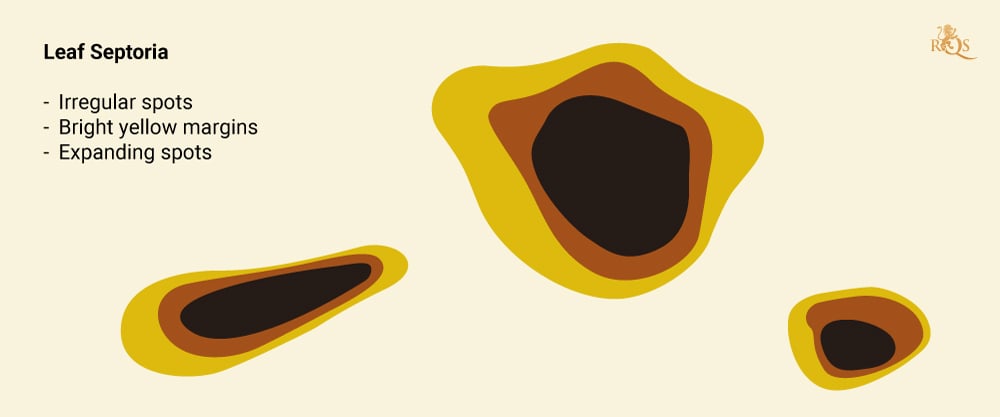
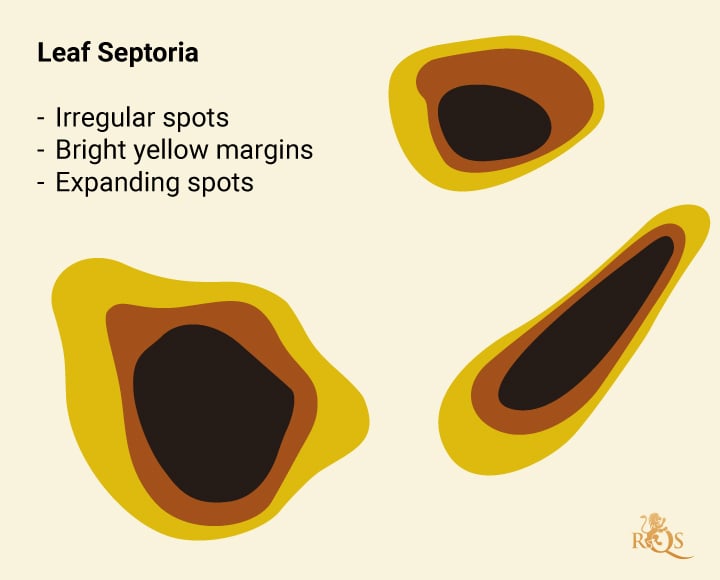
How to Prevent Septoria Leaf Spot
If leaf septoria appears, you can treat it by removing infected foliage and treating plants with fungicide. However, it’s better if you can avoid it in the first place. While outdoor grows are always at risk of developing conditions—they’re in nature after all—there are many steps you can take as a grower to make this less likely.
Plant Spacing
Keeping your plants at a healthy distance from one another—and from other plants—can make the spread of septoria less likely. If foliage is competing for space and is intertwined, then the likelihood of many different infections occurring is much higher.
Giving every plant space to spread its foliage without competition will reduce the overall chances of septoria appearing, and it will definitely protect the crop as a whole if one plant becomes infected.
Maintain Plant Health
Plants, like animals, have immune systems. And like animals, these immune systems are much more effective when the plants’ overall health is good.
So treating your plants well and keeping them happy is one of the simplest and most effective ways to prevent not only septoria, but all infectious conditions.
In practice, this means:
- Watering appropriately
- Feeding appropriately
- Minimising plant stress
- Growing in a suitable substrate
Apply Mulch
Mulching the soil that your plants are growing in can help to stop fungal infections from making their way up to the plant’s foliage. As mentioned, septoria overwinters in rotting leaves, which by the next growing season might look much more like soil.
So if you’re growing directly in the ground, then layering mulch over this soil will help to trap all manner of pathogens, and also help to stabilise the moisture and temperature around your plants’ root systems[11].
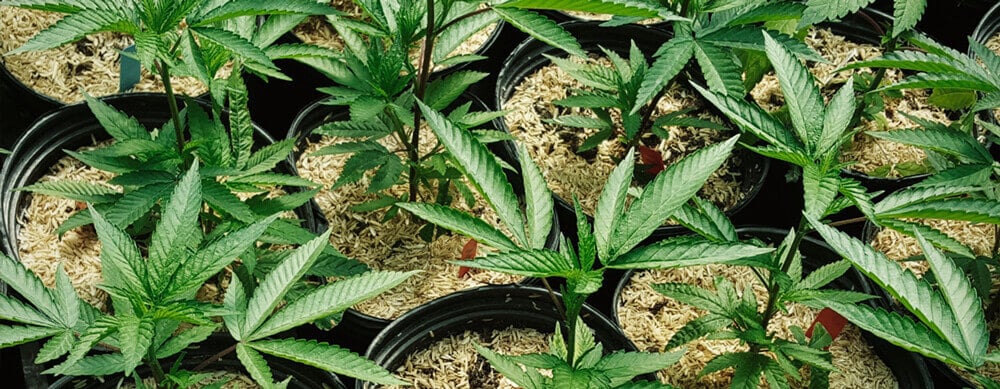
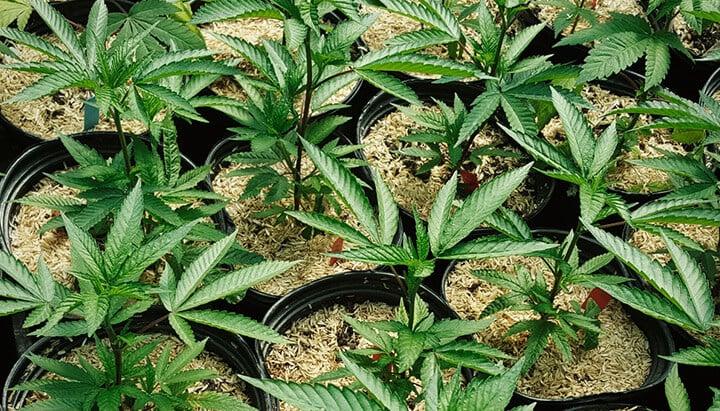
Stay on Top of Weeds
Keeping your cannabis garden free from excess plant growth is also a good way to reduce the chances of septoria and other pathogens spreading. An abundance of growth around your cannabis plants can have some benefits (in the case of companion plants), but it can also make a richer environment for fungi and bacteria to grow.
Certain companion plants can help to reduce the spread of diseases, but uncontrolled growth can increase the spread—so get weeding!
Control Moisture Where Possible
Septoria, like most fungi, thrives in wet conditions. Now, if you’re growing outdoors, there’s not a huge amount you can do to manage the amount of moisture in the environment. But you can plan ahead and plant your crop in such a way that it will be better able to handle adverse conditions.
Many plants crammed in a dank corner are going to be much more susceptible to fungal infections compared to a crop that is spaced out in a well-ventilated area. Many of us don’t have the luxury of choosing the perfect environment to grow cannabis, but do the best with the space available to you. Well-ventilated cannabis tends to be much healthier.
Trichoderma
Trichoderma are beneficial fungi that live in the soil and can help the root systems of cannabis plants in numerous ways. They can also reduce the occurrence and severity[1] of leaf septoria.
Now, adding Trichoderma[13] to the soil is best done from the beginning of a grow, as it develops a symbiotic relationship with a plant’s root system over time. So the longer this relationship has to develop, the more effective it will be.
These organisms are a must for organic cannabis growing, as not only do they help to protect cannabis plants from diseases, but they also help to deliver a range of nutrients to your plants in a more efficient way, improving overall growth.
How to Treat Weed Leaf Septoria
In case prevention methods fail, the good news is that there are a range of treatments available for cannabis leaf septoria, and they don’t need to be destructive either. Biological controls that pose little risk to the environment can be used to great effect—so there’s no need to spray your plants with synthetic fungicides. In fact, as your plants will be flowering, it’s essential that you don’t cover them in toxic chemicals, as you’ll end up consuming them later.
For best results, follow the approach of integrated pest management (IPM). This means that instead of relying on a single, all-powerful solution (such as toxic fungicides), you incorporate a range of less-damaging solutions, which are equally effective.
Remove Infected Foliage
First, remove infected foliage (usually starting at the bottom of the plant). This should halt or slow the spread of the condition, and will make the following treatments more effective. After handling infected foliage, be careful not to touch any healthy parts of your plants until you’ve thoroughly cleaned your hands.
Lactic Acid Bacteria
Lactic acid bacteria (LAB) occur naturally in decomposing soils. If you use them as an amendment and add them to the substrate in which your plants are growing, then they have been shown to improve growth[2] and help defend plants against soil-borne pathogens—such as septoria.
This organic addition to soil can improve the overall quality of the soil and protect your plants from a number of different diseases, meaning that both the wider environment and your crop benefit.
Compost Tea
Compost teas, made using an aerated brewing process, have been shown to control septoria leaf spot disease when applied as a foliar spray. This is an organic treatment that will not harm either the immediate or wider environment, but can work to get this disease under control. Moreover, it should be safe if it touches flowers that will later be consumed.
If you treat your plants with compost tea, you should act fast. Remove infected foliage and treat the remainder of the plant with the foliar spray. Treat at least once per day for a week after the last signs of septoria disappear.
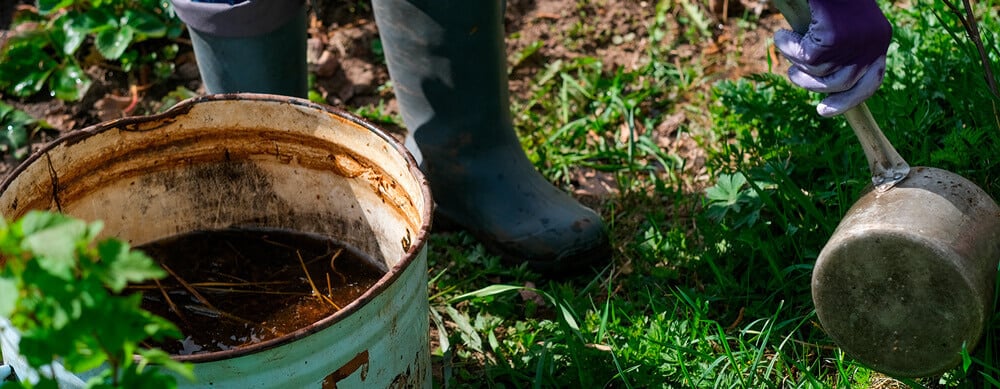
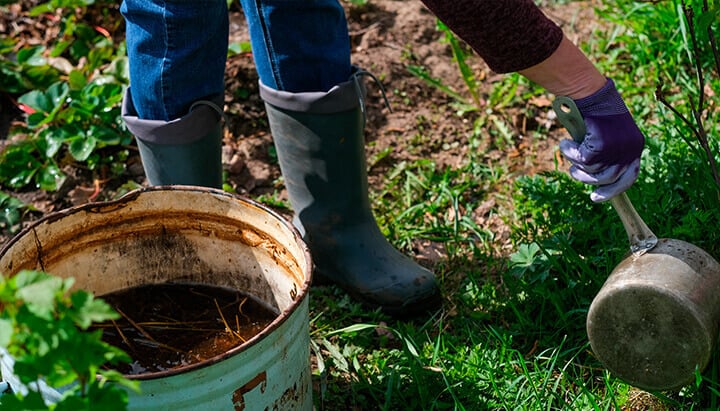
Trichoderma Foliar Spray
As well as being an effective preventative soil amendment, Trichoderma can also be used as a foliar spray against fungal infections[3]. You can easily buy these sprays online, and apply them liberally to your plants. As with other treatments, it’s still advised to remove infected foliage and apply this spray to seemingly uninfected foliage.
JADAM
JADAM (jayeon-eul dalm-eun salamdeul) translates from Korean to something like: "people who resemble nature". It’s actually an entire holistic farming practice that seeks to bring together natural processes with scientific knowledge in order to farm in a sustainable and effective way.
It’s a world unto itself, and there’s plenty we could say about it.
But in regard to leaf septoria, we will just mention organic pesticides here. JADAM natural pesticides (JNP) don’t harm the environment, but are still effective when it comes to protecting crops. You can make them at home, and they consist of three main ingredients:
- Wetting agent: Any soap-like surfactant, this forms the base of the pesticide and helps it to stick to leaves and pests. It also increases the penetrative capabilities of pesticides. You can make it with: soft water, canola oil, and caustic potash.
- Herb solution: This uses herbs or herbal extracts that are repellent to the particular pest we are trying to deal with, in this case, septoria. Some options are: sunchoke, ginkgo, and dried roots of Korean pasque flower.
- Sulphur: Finally, adding JADAM sulphur to your pesticide makes it particularly effective against fungus. Supplement your JWA with: sulphur, caustic soda, water, phyllite powder, red clay powder, and/or sea salt.
Dealing With Septoria Leaf Spot: Stay Vigilant
While it’s not the worst condition when compared to other cannabis diseases, cannabis leaf septoria can be damaging. Fortunately, it can be dealt with. Good growing practice will go a long way to prevent it, but it’s important to learn what to look out for and how to react if it does appear—because sometimes these conditions do, no matter how well we try to prevent them.
An integrated approach to dealing with this problem is your best bet, and means that you don’t have to resort to environmentally damaging fungicides—so everyone wins.
- Biological control of Septoria tritici blotch on wheat by Trichoderma spp. under field conditions in Argentina | BioControl https://link.springer.com
- IJMS | Free Full-Text | Application of Lactic Acid Bacteria (LAB) in Sustainable Agriculture: Advantages and Limitations https://www.mdpi.com
- Effects of Foliar Treatment with a Trichoderma Plant Biostimulant Consortium on Passiflora caerulea https://www.mdpi.com
- Over view of Septoria Diseases on Different Crops and its Management https://www.researchgate.net
- Etiology of Septoria Leaf Spot of Pistachio in Southern Spain https://apsjournals.apsnet.org
- eptoria leaf spot cause by Septoria lycopersici on tomato https://www.plantpathologyjournal.com
- The Most Important Fungal Diseases of Cereals https://www.mdpi.com
- Reemergence of Septoria Leaf https://apsjournals.apsnet.org
- Analysis and modelling of effects of leaf rust and Septoria https://www.researchgate.net
- Analysis and modelling of effects of leaf rust and Septoria https://academic.oup.com
- Mulching: A Sustainable Option to Improve Soil Health https://www.researchgate.net
- Trichoderma/pathogen/plant interaction in pre-harvest food security https://pdf.sciencedirectassets.com



























